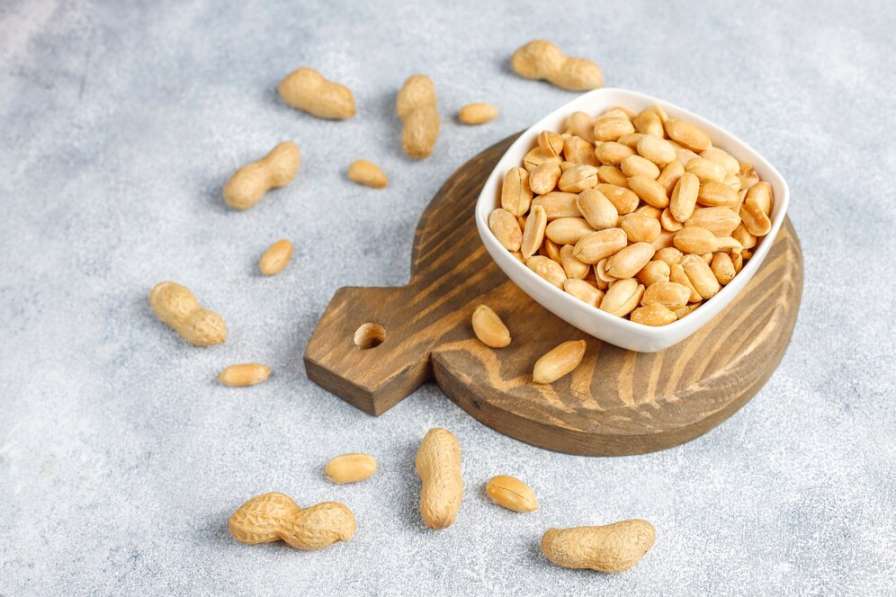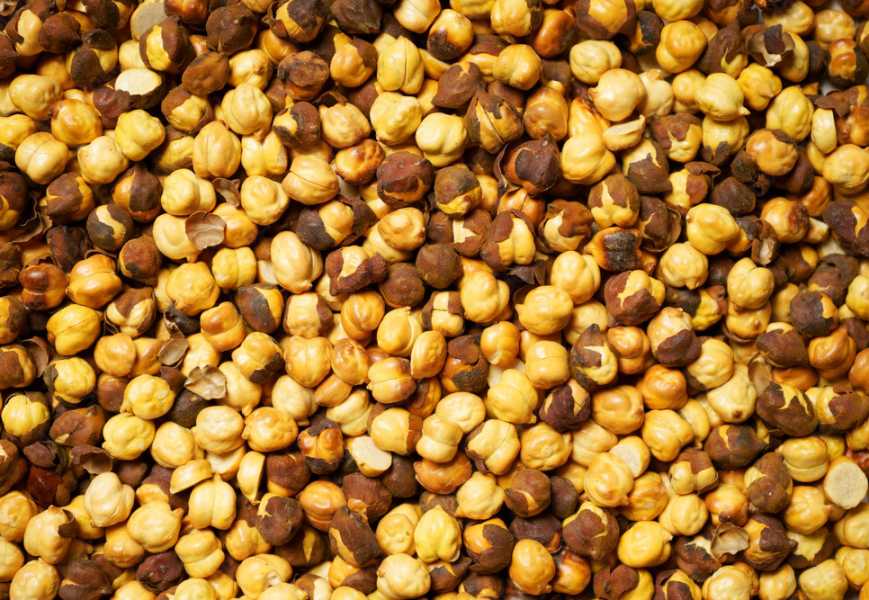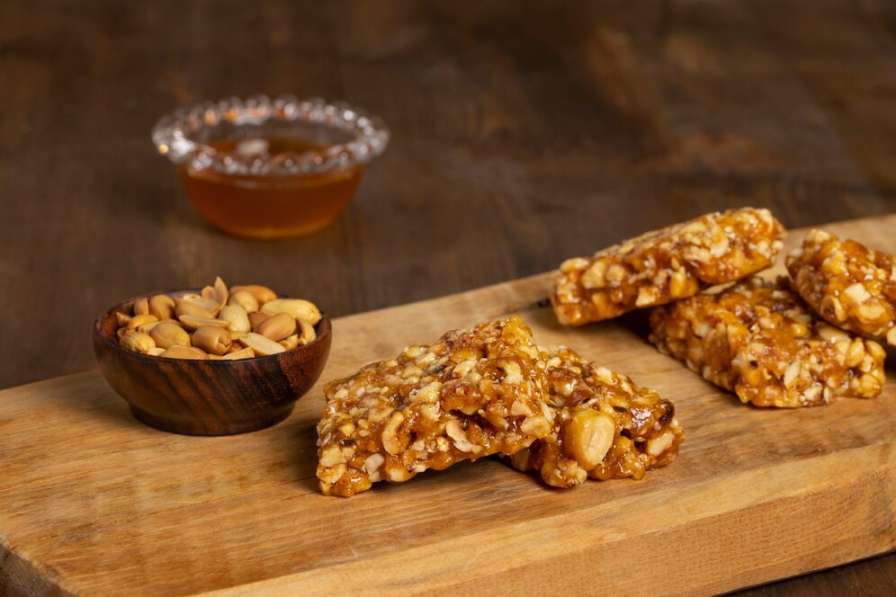
Roasted peanuts benefits: Eating roasted peanuts has numerous benefits. Roasted peanuts are a popular snack in many households throughout the world. Peanuts have earned a place in our hearts and diets, whether you’re snacking on them at a cricket match or combining them into a wonderful sauce for a healthy dinner.
But, when it comes to deciding between roasted and unsalted peanuts, which should you choose? If you’re always in this situation, keep reading, since this article is just for you!
However, before we go into the argument about the benefits of roasted peanuts vs. normal peanuts, let’s first grasp the significance of peanuts and why you should eat them in the first place (if you don’t already).
|People also read: Peanut chikki benefits why you should eat it
Roasted peanuts benefits
Peanuts are more than simply a pleasant snack; they’re also high in nutrients. There are lots of benefits to eating roasted peanuts. Peanuts are a wonderful ally in reducing cravings for bad foods due to their high protein, dietary fibre, and beneficial fat content.
1. Heart Health
Several studies have shown that consuming peanuts reduces the risk of developing any type of heart disease. According to a research published in the New England Journal of Medicine, eating nuts on a regular basis can cut the chance of dying from heart disease by 29%.
Peanuts include elements that are essential for heart health. They include magnesium and copper, as well as a healthy ratio of unsaturated fats and antioxidants such as resveratrol. Peanuts are also high in monounsaturated fats, protein, and fibre, all of which help to lower cholesterol levels. These contain amino acids and antioxidants that protect the inner lining of the arteries, thereby preventing heart problems such as atherosclerosis.
2. High Protein Content
Peanuts contain an important protein content, accounting for 22–30% of their total calories. Protein supports muscle growth and helps build muscular mass while also maintaining bone health. Peanut butter on bread or sandwiches is a great pre-workout or mid-day snack to boost protein consumption. Peanuts can meet a child’s protein requirement, which is required for growth. A high-protein diet also promotes wound healing.
3. Sharpens your brain
Nutrients such as vitamin B1, niacin, and folate are required for a healthy and sharper brain. When you eat peanuts, your body receives these nutrients. Your brain gets more active and sharp as a result. Niacin and vitamin B1 can also aid in the prevention of age-related cognitive decline and disorders such as Alzheimer’s.
Peanuts are high in resveratrol, a bioactive substance. Resveratrol boosts cognitive function and verbal fluency. Peanut polyphenols are recognised as mood foods and can aid with psychiatric and cognitive diseases.
4. Solid Bones
The ageing process weakens various bones in our bodies. As a result, before your bones begin to deteriorate, you should prioritise eating nutritious foods like peanuts. It contains a lot of manganese and phosphorus. These proteins and vitamins found in peanuts will help you maintain the strength of your bones as you age.
5. Skin Health
Roasted peanuts benefits include resveratrol and monounsaturated fats, which not only clear the skin but also wash away toxins from the body, which cause it to appear greasy and lifeless. Resveratrol also delays the appearance of wrinkles, fine lines, and dark spots. It is also a proven treatment for skin conditions such as psoriasis and eczema.
According to research, the vitamins C and E found in peanuts protect against UV radiation and consequent damage. Vitamin C also improves skin suppleness, making it appear younger and brighter.
6. Lowers the risk of cancer
Eating peanuts has been demonstrated in studies to lessen the risk of cancer.
Peanuts are also high in protein and vitamin E, which helps to lessen the risk of cancer. It has a high concentration of resveratrol, which has antioxidant properties and can help prevent cancer by cutting off blood supply to growing cancer cells and restricting cancer cell growth.
7. Helps to prevent gallstones
Gallstones affect approximately 25% of adults each year. Uncontrolled cholesterol levels cause this condition. Consuming peanuts on a regular basis helps minimise the risk of gallstones because they manage cholesterol.
8. Enhances Vision
When it comes to maintaining eye health, the best foods to consume are green leafy vegetables and peanuts. Zinc, which is found in peanuts, aids the body in the transfer of vitamin A, which is essential for clear vision. Furthermore, the vitamin E included in peanuts aids in the prevention of age-related macular degeneration and cataract formation.
9. Nuts that are good for diabetics
Roasted peanuts are perfectly safe for diabetic individuals because they contain no sugar. They are high in nutrients and delicious at the same time.
According to research, eating peanuts in the morning can help keep blood sugar levels stable throughout the day. It may also help to avoid insulin increases when sugary foods are taken. According to an American Medical Association study, eating peanuts on a daily basis increases the body’s natural ability to regulate insulin levels and protects against type 2 diabetes.
10. Assists with weight loss
For people trying to lose weight, peanuts can be added in moderation. The high protein content and healthy unsaturated fats are not only helpful for weight loss but also provide a high satiety value, reducing binge eating. Furthermore, protein lowers the level of ghrelin, the hunger hormone, and stimulates the production of peptide YY, the hormone that makes you feel full.
How to get Ready, Peanuts
Peanuts can be consumed in many forms, such as raw, cooked, roasted, boiled, fried, powdered, or processed into peanut butter. The peanut’s outer layer is rich in antioxidants and phytochemicals, making it nutritionally beneficial to consume them with their thin, papery skin remaining. Adding a certain amount of peanuts to your dietary routine is a simple task, whether you go for whole peanuts or peanut butter.
Recipes that include peanuts:
- Peanuts can be used in the preparation of cookies or pies during the baking process.
- Prepare a sandwich by spreading peanut butter and placing slices of banana between two pieces of bread.
- Spread peanuts over the surface of your yoghurt.
- Add peanuts to your salad.
- Peanut sauce is a delicious ingredient for spring rolls.
|People also read: Roasted chana benefits you Should Know
The Nutritional Facts of Peanuts: Roasted peanuts benefits vs. Regular peanuts
First and foremost, facts! Before we go into the historical controversy about the benefits of roasted peanuts vs. normal peanuts, let’s first review the nutritional facts. Here’s a quick nutritional breakdown of the benefits of 100 grammes of raw and roasted peanuts:
| Nutrient | Roasted Peanuts (per 100g) | Regular (Raw) Peanuts (per 100g) |
| Calories | Approximately 587 calories | Approximately 567 calories |
| Total Fat | About 49 grams | About 49 grams |
| Saturated Fat | About 7 grams | About 7 grams |
| Trans Fat | 0 grams | 0 grams |
| Cholesterol | 0 milligrams | 0 milligrams |
| Sodium | About 10 milligrams | About 2 milligrams |
| Total Carbohydrates | Approximately 21 grams | Approximately 16 grams |
| Dietary Fibre | About 7 grams | About 6 grams |
| Sugars | About 3 grams | About 3 grams |
| Protein | About 26 grams | About 26 grams |
| Vitamin D | 0 IU | 0 IU |
| Calcium | About 35 milligrams | About 49 milligrams |
| Iron | About 1.9 milligrams | About 2.2 milligrams |
| Potassium | About 705 milligrams | About 705 milligrams |
This table compares the nutritional value of roasted and ordinary (raw) peanuts per 100 g serving, which is a more frequent reference point for nutritional analysis.
So, since there isn’t much of a nutritional difference between roasted and ordinary peanuts, why do we roast them in the first place?
People also read: Roasted Soybean Benefits you should know about it

Why should you select roasted and normal peanuts over junk food?
- There are numerous benefits to eating roasted peanuts. Peanuts are high in antioxidants and important minerals. They’re high in monounsaturated and polyunsaturated fats, both of which are heart-healthy and can help lower harmful cholesterol levels
- Because of their high protein content, they might keep you fuller for longer, making them a perfect snack for individuals aiming to lose weight. Furthermore, peanuts contain vitamins and minerals such as magnesium, potassium, and vitamin E, all of which are important for overall health.
- So that peanuts in any form are nutritious and preferable to other junk food in your diet.
What is the purpose of roasted peanuts?
Roasted peanuts improve their flavour, giving them a richer, deeper flavour than raw peanuts. The roasting process also improves their crispy texture. Furthermore, roasting nuts might occasionally make them simpler to digest for some people.
The Art of Roasting: Techniques Unveiled
- Dry-roasting: This method uses no oil. The peanuts are roasted in an oven or on a skillet using simply heat to cook. It produces a less oily product and can slightly enhance the natural flavour of the nut.
- Oil-roasting: Peanuts are roasted in oil, as the name implies. When compared to dry-roasted peanuts, this process produces a richer flavour and a slightly different texture.
What Happens to Peanuts When Roasted?
The nutritional profile of roasted peanuts alters after roasting. While the protein and carbohydrate content stay largely constant, the lipid composition can fluctuate, particularly when oil-roasted.
Heat can cause some modest vitamin losses, such as vitamin E. Furthermore, some research suggests that roasting may result in a modest decrease in antioxidant levels.
Tips for Perfect Roasted Peanuts Benefits:
- Pay attention to the temperature. Peanuts should not be roasted at extremely high temperatures, since this may result in the production of harmful compounds.
- Keep track of time: Over-roasting not only changes the flavour of peanuts, but it also reduces their nutritional content.
- Taste Test: Watch the peanuts carefully while they’re cooking to make sure they’re done the way you like them.
So that means you can only eat roasted peanuts? That is not the case. Go for it if you like the taste of normal peanuts. There are, however, some precautions you should take before eating normal peanuts.
What is the best peanut for you?

- Both roasted and normal peanuts have distinct characteristics and benefits.
- Roasted peanuts are your go-to if you like a deep, rich flavour with a crispy texture. Regular peanuts may be more to your liking if you want a more natural flavour and a somewhat softer texture.
- In essence, your personal preferences and tastes determine the ideal peanut for you. You can eat them as a healthy snack, in your favourite cuisine, or even as a delicious peanut butter spread.
People also read: Puffed millet benefits you have to know your better health
Precautions for Regular Peanuts
We considered all the important points about the benefits of roasted peanuts. While both raw and ordinary peanuts offer advantages, be sure they are free of aflatoxins, a group of hazardous toxins produced by specific moulds. To avoid mould formation, store them in a cool, dry area and consume them before the expiration date.
Conclusion
Peanuts are little packets of micro and macronutrients. They provide a variety of health and nutritional benefits. Including peanuts in your diet plan will help you not only build muscle but also lose weight. Furthermore, because of its high protein content and numerous vitamins, minerals, and plant components, this is a nut that may be consumed on a regular basis. However, because of its high calorie and fat content, it should be consumed in moderation.
Disclaimer: The intention of this article is simply to disseminate information and promote awareness. It is not intended to replace expert medical advice. Please contact our qualified nutritionists for further details.
Frequently Asked Questions (FAQs)
1. How many peanuts should I consume each day?
A handful of peanuts is equivalent to around 30 peanuts. 2 tablespoons of peanut butter equal one serving. It is usually suggested that individuals consume 4-6 servings of nuts each week, such as peanuts. Epidemiological studies have indicated that eating just one ounce of peanuts or half a serving of peanut butter every day can reduce the risk of heart disease by 48% or diabetes by 20%.
2. Can peanuts help with high blood pressure?
Yes, studies demonstrate that eating roasted peanuts on a daily basis helps lower blood pressure, especially in people with high blood pressure. According to one study, “participants with elevated blood pressure at baseline had significant decreases in diastolic blood pressure” after eating peanuts. Find out why peanuts are good for your heart.
3. Are salted peanuts healthy?
Yes! Peanuts that have been lightly salted are a low-sodium food. Foods with fewer than 140mg of salt per serving, according to the FDA, are classified as “low-sodium foods.” An ounce of roasted, salted peanuts is high in niacin and manganese and low in fibre, phosphorus, vitamin E, folate, copper, and magnesium.
4. How are peanuts produced?
Peanuts, as opposed to tree-grown nuts like walnuts and almonds, grow underground.. Check out our peanut facts to learn everything there is to know about the benefits of roasted peanuts.
5. What are the benefits of roasted peanuts for the female body?
Groundnuts can help women in a variety of ways. Peanuts can help you manage your weight and improve the quality of your diet, in addition to preventing chronic diseases that affect women. Peanut consumption has been linked to a significantly decreased risk of breast cancer. Regular peanut eating can also reduce a woman’s risk of developing heart disease after menopause, when this risk is at its highest. Here are some additional benefits of peanuts for women.


